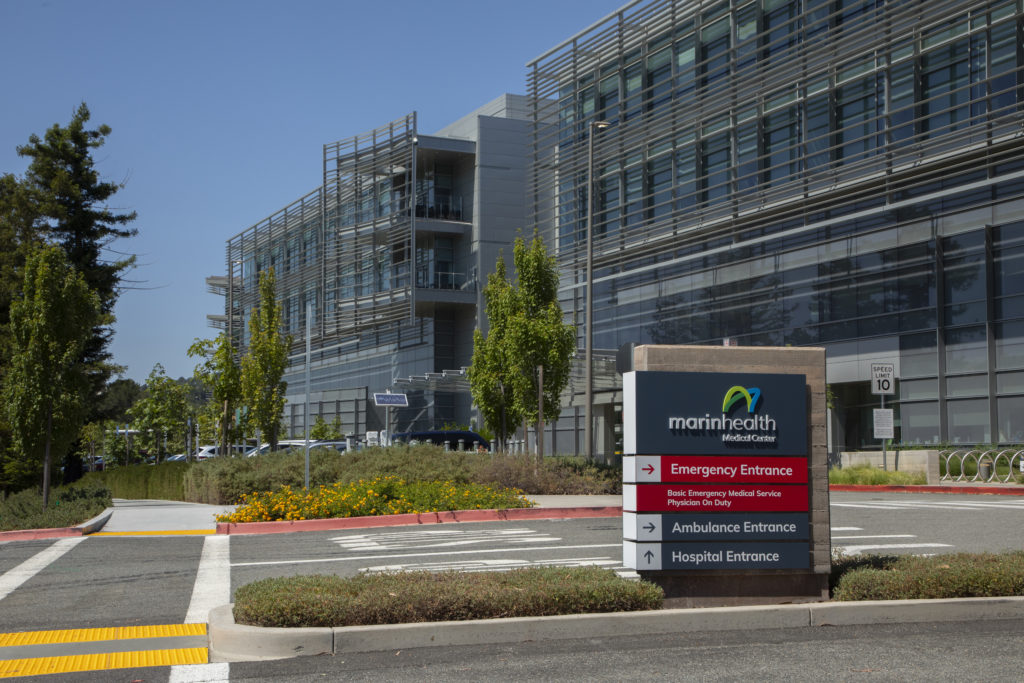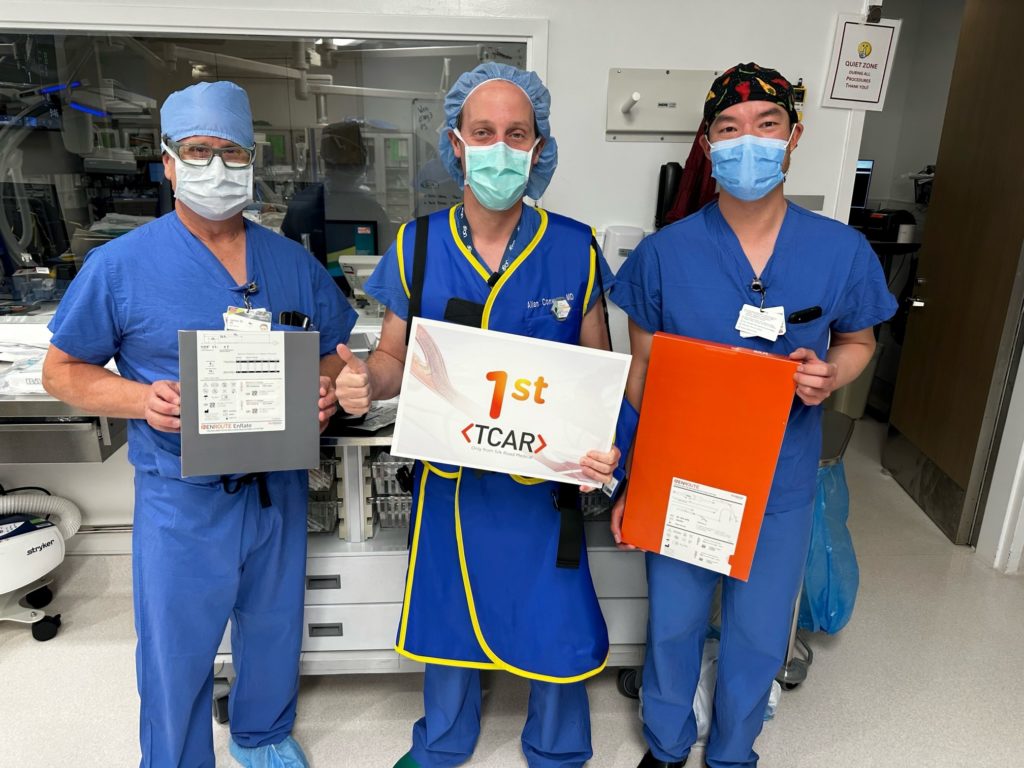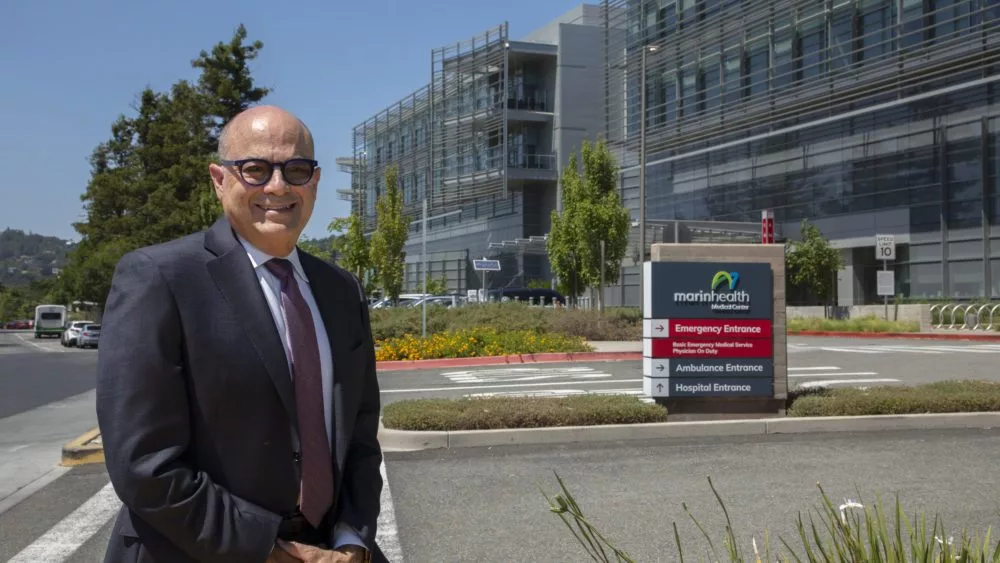“I loved it––I miss it every day,” says David Klein, MD, chief executive officer of MarinHealth, about his 14 years as a surgeon before hanging up his scrubs to become a healthcare executive. “I loved working with my hands and making a difference in people’s lives. I performed lots of trauma surgery, enough for a lifetime, and enjoyed getting to know patients and their families. I left the OR in 2004, and I just eclipsed my years as a surgeon with my years in healthcare management. The opportunity to impact healthcare on a broader scale in a management capacity has been as equally fulfilling as being a surgeon.”
Overseeing MarinHealth’s operations, based in Greenbrae, keeps Klein busy and engaged. “We are thriving as an independent hospital [the former Marin General Hospital], and not too many in the state or in the nation can say that,” he explains. “Many hospitals across the country have had challenges, including retirements stemming from the pandemic, and we are no exception.”
One of the good things about being independent, he says, is it keeps MarinHealth nimble enough to make locally focused decisions. “I have been a part of large healthcare systems that focused on the ‘many,’ but ultimately healthcare is local, and so we focus on the needs of our community. All decisions stay local, and that’s part of the reason we are still here.”
Celebrating 70 years of service to Marin County last year, MarinHealth has been a presence in different configurations since 1952, when Marin General Hospital first opened [see sidebar]. “We’ve had changes in ownership and facilities down through the years, but the important thing to remember is nobody has ever been turned away from receiving care,” says Klein. “We are the county’s hospital, handling areas that are typically underfunded, and it’s necessary in our commitment to the community.”
Today, MarinHealth has approximately 2,369 employees, 1,815 of those hospital-based. As many as 350 to 400 of those employees staff the health system’s outpatient clinics (of which there are 55 locations with MarinHealth-affiliated physicians and support staff in the North Bay), and more than 250 physicians make up the MarinHealth medical network. The hospital in Greenbrae totals 334 beds, which includes 114 rooms in the newer Oak Pavilion building. In total, the Greenbrae campus comprises more than 570,000 square feet of hospital and treatment space. It is a full-service hospital, and the Level II trauma center for the region. It’s also the only hospital in Marin that provides maternity services.
Managing COVID-19
Klein commenced his duties as CEO of MarinHealth in the midst of the COVID-19 pandemic, stepping into a new position during an unprecedented time. “MarinHealth was lucky to have a brand-new hospital when COVID-19 arrived, so we had appropriate room isolation methods in place; all rooms had monitors for family televisits; and we maintained physical separations between medical staff, nursing staff and families so we weren’t mixing air from different rooms. We quickly learned how to navigate the different mandates. We learned how to be robust and to detail and update policies and processes, and now we have a whole series of procedures in place for novel viruses.”
There was discrepancy between the regulatory environment and the novel virus response, Klein says, and so Marin County health teams and departments helped with a unified response. “We tried not to duplicate efforts and learned to collaborate and work with regulatory agencies for those rules that didn’t make sense to us. We also had to manage misinformation and communicate better and more broadly. To do that we had hospital incident command systems set up throughout the pandemic. What stands out most for me was witnessing the resilience of our staff and their willingness to care for patients even at their own risk.”

From the way Klein and the MarinHealth team responded to the pandemic, it was clear they didn’t see themselves as a silo of healthcare in the community, says Matthew Willis, MD, public health officer for Marin County. “Instead of waiting for COVID-19 cases to flood in to the hospital for treatment, Dr. Klein knew he had to partner across agencies to prevent infections in the community. Our goal was to protect our hospitals from being overwhelmed, and to save lives.”
At every stage, adds Willis, MarinHealth helped lead the wider community response—working to increase access to testing, vaccinations and treatment. “MarinHealth leaders spoke out to support public health measures, and mobilized into long-term care facilities where outbreaks were happening, to protect our most vulnerable residents,” says Willis. “Dr. Klein supported a strike team to control nursing home outbreaks made up of doctors and nurses from all three Marin County hospitals and public health.”
That kind of alliance, where MarinHealth pooled resources across agencies for the greater goal of saving lives, was critical to the county’s response, says Willis.
“So the hospitals were busy but not overwhelmed with COVID-19 cases,” he says. “The MarinHealth team has been a key ingredient in that success.”
One positive change that came out of the pandemic was the ability for health systems to adopt a telehealth model. “Telehealth had not been allowed in many places before COVID-19, and in our post-pandemic environment we have continued remote and hybrid meetings,” explains Klein. “So where once we would have normally gathered in person for certain meetings, they are now conducted via Zoom. As medical service providers, only a small percentage of our staff can work from home.”
Klein says MarinHealth and other agencies created a “traveling road show” to take COVID-19 vaccines to nursing homes and to other parts of the community that were “lacking good access to healthcare.”
To date, according to Willis, Marin County has among the highest COVID-19 vaccination rates in the state (91%) and the lowest mortality rates. The number of COVID-19 vaccine doses administered in Marin County now total more than 822,000. Klein adds that, “Marin County is unique, as it is one of the healthiest counties in the state, and the overall community is very health conscious.”
Tackling the fentanyl crisis
Despite its health-conscious population, Marin County struggles with a high number of opioid overdose deaths, averaging one death every five days. A coalition of the Marin County medical community, law enforcement, schools, pharmacies and substance-abuse service providers created RX Safe Marin in 2014 to combat the growing problem of prescription opioid abuse. When the synthetic opioid fentanyl came on the scene a few years later, the coalition pivoted to educating the community on this illicit and deadly substance and in 2022 renamed itself OD Free Marin.
Accidental drug overdose, according to Willis in a report he delivered before the Marin County Board of Supervisors in March, is now the No. 3 cause of death in the county for residents under the age of 75––after cancer and heart disease.
Fentanyl overdose can be reversed with the immediate intervention of Narcan, a nasal spray antidote that was changed from prescription-only to over-the-counter status in March and is now more readily available to anyone who thinks they might need it––sooner or later––to help save a life. To make certain the population in Marin has easy access to Narcan, four vending machines are located in San Rafael, where it is dispensed for free. A fifth vending machine is in Point Reyes Station. Many pharmacies also carry Narcan for a fee, and all Marin County schools have been allocated supplies of Narcan for on-campus use.
“MarinHealth is committed to providing education about the dangers of fentanyl, the pervasiveness of the drug in the community, and what to do if someone overdoses,” says Klein. “We also include information about Narcan, the nasal spray used to reverse or reduce the effects of opioids, and where to get it.”
Sinking reimbursements, rising costs
MarinHealth is not only Marin County’s largest hospital, says Willis, it’s also the only public hospital. “MarinHealth receives taxpayer support for serving all residents regardless of income or insurance type. As an example, most 9-1-1 responses for unhoused or uninsured residents are routed to MarinHealth. From a public health standpoint, it’s vital that everyone have access to healthcare.”
Willis says it’s reassuring to know that everyone who enters MarinHealth’s doors, regardless of their means, can expect the same high standard of care. “That isn’t easy to do, and it requires an upfront commitment to health equity and strong fiscal management. The MarinHealth team is public-health-oriented. They recognize that preventing diseases and preventing avoidable hospitalizations among underinsured and uninsured residents is important for health equity and for fiscal stability.”
But the reality, says Klein, is that most taxes don’t pay enough to cover the costs of the uninsured. “MarinHealth tends to see more underinsured than uninsured and, in general, with the reimbursements we receive from most government payors we struggle to cover our costs, so we have to be good operators and manage funds well.”
Today, adds Klein, many hospitals are underwater and unable to turn a profit because of losses incurred from treating the underinsured and uninsured. “We look at the headwinds going forward––the sinking reimbursements and the rising costs––and how our wage numbers have gone up significantly. Our pharmacy costs have also escalated, and some essential medications cost 100% more than last year. So costs are going up faster than our revenues.”

That’s why partnering with other healthcare entities is so important, he says. “To offer a full spectrum of care, we partner with UCSF to round out some of our services. We also partner with Marin Community Clinics and Meritage Network.”
A larger North Bay presence
MarinHealth’s goal, Klein adds, is safety, quality and an excellent patient experience. “We believe strongly in our employees and physicians, and in retention and wellness and resilience. MarinHealth provides a strong place to work, and it’s important that our employees are proud of working here. Service is vitally important, so when we have service issues come up, we try to identify areas where we need improvement and can do better.”
To that end, MarinHealth operates physician practices in many cities and towns in Sonoma and Napa counties. “We are truly a North Bay healthcare system, not just for Marin County. MarinHealth is always looking for ways to help the growing North Bay,” he says.
To get the word out, MarinHealth has launched a new brand marketing and advertising campaign that emphasizes its commitment to providing world-class care delivered by highly-skilled physicians, says Klein. “The campaign recognizes MarinHealth’s commitment to pushing the boundaries of medicine and remaining diligent in helping patients achieve their optimal health.”
This summer, MarinHealth will begin to offer obstetrics services full-time at its Petaluma location on Professional Drive. It’s also building a large outpatient ambulatory clinic adjacent to Petaluma Valley Hospital. “That construction,” he says, “has been approved, and by fall of 2024 we will have a large, new medical office space with cardiology and urology services, among others.”
The recent closure of the Family Birthing Center at Petaluma Valley Hospital created an obstetrics desert in southern Sonoma County, and MarinHealth was prepared to step in and fill the need. “We had some warning about the closing of the birthing center, and we have a number of MarinHealth physicians who practice in the Petaluma area,” says Klein. “Already, a little more than 12% of our births come from southern Sonoma County, and we are seeing a higher percentage of these patients coming down to MarinHealth. Our OB department takes amazing care of maternity patients, and we are projected to see more than 1,800 births this year.”

Staying patient-centered
Klein says MarinHealth’s success is rooted in its people and their talents. “This is a complicated time in healthcare with patient access and staffing shortages. But we always put the patient at the center of everything we do.”
Would he ever return to the operating room in the event of a crisis? “Well, I read all the medical journals about new innovations in surgery, and I keep my license up to date. But the staff knows I’m no real threat in the OR,” he adds with a laugh.



